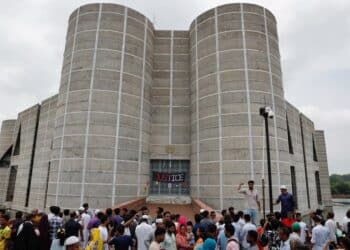Major IT outages have hit industries across the world; almost 1,400 flights have been cancelled and airports, hotels, banking, healthcare and shops were affected after Windows machines displayed errors worldwide.
In the early hours of Friday, companies in Australia running Microsoft’s Windows operating system started reporting devices showing Blue Screens of Death (BSODs). Shortly after, reports of disruptions started flooding in from around the world, including from the UK, India, Germany, the Netherlands, and the US: TV station Sky News went offline, and US airlines United, Delta, and American Airlines issued a “global ground stop” on all flights.
The widespread Windows outages have been linked to a software update from cybersecurity giant CrowdStrike. It is not believed the issues are linked to a malicious cyberattack, cybersecurity officials say but stem from a misconfigured/corrupted update that CrowdStrike pushed out to its customers.
Engineers from CrowdStrike posted to the company’s Reddit forum that it has seen “widespread reports of BSODs on Windows hosts” occurring across its software, is working on the problem, and has advised a workaround for impacted systems. It also issued instructions to its customers in an advisory.
The incident, so far, appears to only be impacting devices running Windows and not other operating systems. It is unclear exactly how widespread the issues are and how long they will take to resolve. Microsoft and CrowdStrike did not immediately respond to WIRED’s requests for comment on the outage.
Global IT Outages: What You Need to Know
What is behind the outage? The IT outages appear to stem at least partly from a software update issued by Crowdstrike, on Microsoft Windows systems. The US cybersecurity firm told customers early Friday that engineers were addressing the problem, according to an advisory viewed by CNN. The issue is specific to Falcon, which is designed to protect files saved in the cloud.
How long will the outage last? Microsoft said the “underlying cause” of the outage “has been fixed,” adding that residual impact is still affecting some services. “We’re conducting additional mitigations to provide relief,” the tech company said in a post on X. Some services have been restored, but others are still grappling with the disruptions.
Who has been affected? Global banks, medical services and critical infrastructure have been impacted by the outage. Medical providers including the UK’s National Health Service, and one of Europe’s largest health facilities in northern Germany, have been stifled by IT delays. Meanwhile, banks, broadcasting outlets and supermarkets in Australia, New Zealand and the UK were affected, including ABC News and Sky News.
Airlines worst hit: Scenes emerged of flustered travellers filling the corridors of major airports on Friday, as US and other international carriers in Europe, Asia and the Middle East had to delay and cancel flights. There are around 110,000 scheduled commercial flights today worldwide, according to preliminary data from Cirium, an aviation analytics company, shared with CNN. As of 6 a.m. ET, there were 1,390 cancelled flights globally. That figure is growing.
International response: The White House says it is “looking into” the disruption caused by Friday morning’s cyber outages. “We’re aware of the incident and are looking into the issue and impacts,” a White House National Security Council spokesperson told CNN. Meanwhile, the UK government held an emergency meeting to discuss the outage, Downing Street said, according to the UK’s PA Media news agency.











